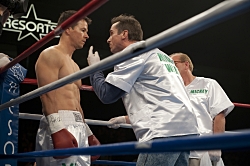Writer/director Jean-François Richet grew up in the Paris projects and comes with an anti-authortitarian stance, as evidenced in his earlier, inner city films, État Des Lieux and Ma 6-T Va Crack-er. It spurred him on to make not one, but two acclaimed films about the gangster Jacques Mesrine – bankrobber, womaniser, jailbreaker, fugitive – who was popular with the masses while remaining the scourge of the French establishment across the 60s and 70s. After an American sojourn, in which Richet had commercial success with a remake of the action flick, Assault On Precinct 13 (starring Ethan Hawke), the 43-year-old has returned to produce his finest work yet, scooping a César (the French Oscar) for this powerful brace of movies, to be released in the UK as Mesrine: Killer Instinct and Mesrine: Public Enemy No. 1.
Popular on LondonNet
Although you’ve been vindicated with a huge hit in France, it’s still a bold move dividing the story into two films. Were you ever going to do it just as one epic four-hour movie?
When the producer presented the project to me it was already a diptych. I said no. So we worked on it to rewrite it and realised we needed three films! It was already risky doing two films, but now they know that it works.
Speaking of risk, is it true you financed your first film through gambling?
It’s true. For six months I was at the casino every weekend and every Wednesday playing roulette. We didn’t win a lot, about 20,000 euros, but it was enough. Each time I just put it all on red or black.
Would you recommend this as a method for aspiring filmmakers?
It’s a method to lose your head because it was a very nervous situation. Afterwards I never played the game again. It was just for the film.
The Mesrine biopic has had a very long gestation, seven years in production, with a previous director coming and going.
Actually before this they were trying for thirty years to make a film, Originally it was for Jean-Luc Godard, but Godard (no lover of Mesrine) didn’t want to touch the film. Godard’s project was to have Jean-Paul Belmondo sitting on a chair reading from the book (Mesrine’s autobiography, L’Instinct De Mort, written and published while in jail).
It’s an extraordinary performance by Vincent Cassel in the lead role. He had to do a De Niro and put on four stone to play the middle-aged Mesrine. A consequence was that you had to shoot the film in reverse chronological order.
He said, for a month beforehand I won’t be able to lose weight but I can gain weight, then I can lose it during shooting. It was a difficult one to do, this reverse shooting, because (normally) you have to build a character. Here you’re starting with the end.
You co-wrote the script. It must have involved some extensive research.
I met a lot of people – his daughter, (revolutionary) Charlie Bauer, and (lover/accomplice) Jeanne Schneider… and a lot of cops.
According to Cassel, even when Mesrine was a fugitive from justice, he was a well-known figure around certain Parisian nightspots, but everyone kept his presence secret.
Absolutely. Because in 1975 he was voted the most popular guy in France.
The danger when making a film about a criminal like this is that you can make him a martyr. He is, after all, a cold-blooded killer. Was it difficult walking that line?
Yes, because Vincent is very charismatic. We had supervision all the time and had to be careful not to overdo it. We had to do an honest job and show the dark side of him as well the light side of him.
Towards the end, Mesrine was flirting with radical left-wing politics, positioning himself as a champion of the oppressed. Some say he was genuine, others that it was just a ruse.
I won’t go as far as saying he was a revolutionary, but his thinking had been shaped by his experiences.
Whatever you think of him, people still get upset about the manner of his execution – effectively gunned down by a government hit squad during the Paris rush hour, without warning, in front of onlookers.
When I went on location with Vincent, an old woman, upper class, came up to us asked them what we were doing there. We said we were making a film about Mesrine. She said, ‘I am not left wing but a democratic state doesn’t have the right to bring down someone in the street like that.’
Mesrine was undoubtedly a complex man. What one thing endures?
Giving your word is giving your word even if your life is at risk. Despite the disgusting choice of becoming a gangster, he was, up till the end, an honourable gangster.







